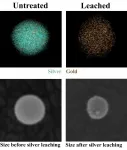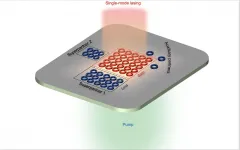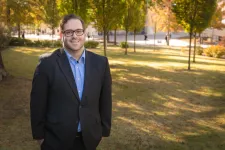Naturally GM: Crops steal genes from other species to accelerate evolution
2021-04-23
(Press-News.org) Grass crops are able to bend the rules of evolution by borrowing genes from their neighbours, giving them a competitive advantage, a new study has revealed.
Research, led by the University of Sheffield, is the first to show that grasses can incorporate DNA from other species into their genomes through a process known as lateral gene transfer.
The stolen genetic secrets give them an evolutionary advantage by allowing them to grow faster, bigger or stronger and adapt to new environments quicker. These findings could inform future work to create crops that are more resistant to the effects of climate change and help to tackle food security problems.
The Sheffield team studied grasses, which include some of the most economically and ecologically important plants, such as the most globally cultivated crops wheat, maize, rice and barley.
Dr Luke Dunning, senior author of the research from the Department of Animal and Plant Sciences at the University of Sheffield, said: "Grasses are taking an evolutionary shortcut by borrowing genes from their neighbours. By using genetic detective work to trace the origin of each gene, we found over 100 examples where the gene had a significantly different history to the species it was found in.
"The findings may make us as a society reconsider how we view GM technology, as grasses have naturally exploited a very similar process. If we can determine how this process is happening it may allow us to naturally modify crops and make them more resistant to climate change.
"What we are seeing is not hybridisation, but the consequences are similar. Lateral gene transfer can move genetic information across wider evolutionary distances, which means it can potentially have even bigger impacts.
"Whilst only a relatively small proportion of genes are transferred between species, this process potentially allows grasses to cherry pick information from other species. This likely gives them huge advantages and may allow them to adapt to their surrounding environment quicker.
Samuel Hibdige, first author of the research and PhD Researcher from the University of Sheffield, said: "We still don't know how this is happening or what the full implications are. But, we know it is widespread in grasses, a family of plants that provide a majority of the food we eat.
"We detected foreign DNA in a wide range of grasses with all kinds of life history strategies indicating it is not restricted to those with a specific trait. However, we did detect a statistical increase in species which possess certain kinds of modified stems called rhizomes."
Since Darwin, much of our understanding of evolution has been based on the assumption that common descent is the rule for plant and animal evolution, with genetic information passed from parents to offspring.
The team's next steps will be to determine the biological mechanism behind this phenomenon and to investigate whether this is an ongoing process in crops that contributes to the differences we observe between crop varieties.
INFORMATION:
For further information please contact: Emma Griffiths, Media and PR Assistant, University of Sheffield, 0114 222 1034, e.l.griffiths@sheffield.ac.uk
Notes to editors
The research received funding from the European Research Council (ERC), the Royal Society and the Natural Environment Research Council (NERC).
The University of Sheffield
With almost 29,000 of the brightest students from over 140 countries, learning alongside over 1,200 of the best academics from across the globe, the University of Sheffield is one of the world's leading universities.
A member of the UK's prestigious Russell Group of leading research-led institutions, Sheffield offers world-class teaching and research excellence across a wide range of disciplines.
Unified by the power of discovery and understanding, staff and students at the university are committed to finding new ways to transform the world we live in.
Sheffield is the only university to feature in The Sunday Times 100 Best Not-For-Profit Organisations to Work For 2018 and for the last eight years has been ranked in the top five UK universities for Student Satisfaction by Times Higher Education.
Sheffield has six Nobel Prize winners among former staff and students and its alumni go on to hold positions of great responsibility and influence all over the world, making significant contributions in their chosen fields.
Global research partners and clients include Boeing, Rolls-Royce, Unilever, AstraZeneca, Glaxo SmithKline, Siemens and Airbus, as well as many UK and overseas government agencies and charitable foundations.
ELSE PRESS RELEASES FROM THIS DATE:
2021-04-23
A radically reformed approach to education, in which different subjects teach connected themes, like climate change or food security, is being proposed by researchers, who argue that it would better prepare children for future crises.
In a newly-published study, education researchers from the Universities of Cambridge and Edinburgh argue that there is a compelling case for a drastic shake-up of the school curriculum, so that subjects are no longer taught independently of one another. Instead, they argue that the arts and sciences should 'teach together' around real-world problems, and in a manner ...
2021-04-23
California produces nearly 4 million tons of world-class wine each year, but with that comes thousands of tons of residue like grape skins, seeds, stems and pulp. What if scientists could harness that viticultural waste to help promote human health?
Maybe they can, according to new research from food scientists at the University of California, Davis. In a study published in the journal LWT - Food Science and Technology, the team discovered a wealth of potentially health-enhancing compounds and sugar molecules called oligosaccharides within chardonnay wine-grape pomace.
Oligosaccharides are found in many plant and animal tissues, including human breast milk. Recent advances have revealed oligosaccharides' vast potential ...
2021-04-22
HOUSTON - (April 22, 2021) - There's gold in them thar nanoparticles, and there used to be a lot of silver, too. But much of the silver has leached away, and researchers want to know how.
Gold-silver alloys are useful catalysts that degrade environmental pollutants, facilitate the production of plastics and chemicals and kill bacteria on surfaces, among other applications. In nanoparticle form, these alloys could be useful as optical sensors or to catalyze hydrogen evolution reactions.
But there's an issue: Silver doesn't always stay put.
A new study by scientists at Rice University and the University ...
2021-04-22
RESEARCH TRIANGLE PARK, N.C. -- New photonics research paves the way for improved lasers, high-speed computing and optical communications for the Army.
Photonics has the potential to transform all manners of electronic devices by storing and transmitting information in the form of light, rather than electricity. Using light's speed and the way information can be layered in its various physical properties can increase the speed of communication while reducing wasted energy; however, light sources such as lasers need to be smaller, stronger and more stable to achieve that, researchers ...
2021-04-22
PHILADELPHIA-- Art appreciation is considered essential to human experience. While taste in art varies depending on the individual, cognitive neuroscience can provide clues about how viewing art affects our neural systems, and evaluate how these systems inform our valuation of art. For instance, one study shows that viewing art activates motor areas, both in clear representations of movement, like Adam and Eve in Michelangelo's Expulsion from Paradise, and in implied movement through brush strokes, like in Franz Kline's gestural paintings.
Altered neural functioning, like that experienced in patients with Parkinson's disease, changes the way ...
2021-04-22
University of Arkansas law professor Jordan Blair Woods challenges the conventional wisdom that only police can enforce traffic laws.
In "Traffic Without Police," to be published in Stanford Law Review, Woods articulates a new legal framework for traffic enforcement, one that separates it from critical police functions, such as preventing and deterring crime, conducting criminal investigations and responding to emergencies.
If not the police, who then would enforce traffic laws? As Woods explains, jurisdictions would delegate most traffic enforcement to newly created traffic agencies. These public offices would operate independently from ...
2021-04-22
Researchers at Carnegie Mellon University and McGill University have adapted an algorithm first developed to spot anomalies in data, like typos in patient information at hospitals or errant figures in accounting, to identify similarities across escort ads.
The algorithm scans and clusters similarities in text and could help law enforcement direct their investigations and better identify human traffickers and their victims, said Christos Faloutsos, the Fredkin Professor in Artificial Intelligence at CMU's School of Computer Science, who led the team.
"Our algorithm can put the millions of advertisements together and highlight the common parts," Faloutsos said. "If they have a lot of things in common, it's not guaranteed, but it's highly likely that it ...
2021-04-22
An international group of scientists from Italy, the USA, China and Russia have studied the relationship between collectivism, individualism and life satisfaction among young people aged 18-25 in four countries. They found that the higher the index of individualistic values at the country level, the higher the life satisfaction of young people's lives. At the individual level, however, collectivism was more significant for young people. In all countries, young people found a positive association between collectivism, particularly with regard to family ties, and life satisfaction. This somewhat contradicts and at the same time clarifies the results ...
2021-04-22
BOSTON - Exclusively using (or "vaping") e-cigarettes can help people quit smoking, but many people using e-cigarettes to quit smoking continue to smoke cigarettes. New research led by investigators at Massachusetts General Hospital (MGH) reveals that respiratory symptoms--such as cough and wheeze--are more likely to develop when people use both e-cigarettes and tobacco cigarettes together compared with using either one alone. The findings are published in the American Journal of Respiratory and Critical Care Medicine, the flagship journal of the American Thoracic Society.
The ...
2021-04-22
A new study by Simon Fraser University historical ecologists finds that Indigenous-managed forests--cared for as "forest gardens"--contain more biologically and functionally diverse species than surrounding conifer-dominated forests and create important habitat for animals and pollinators. The findings are published today in Ecology and Society.
According to researchers, ancient forests were once tended by Ts'msyen and Coast Salish peoples living along the north and south Pacific coast. These forest gardens continue to grow at remote archaeological villages on Canada's northwest coast and are composed ...
LAST 30 PRESS RELEASES:
[Press-News.org] Naturally GM: Crops steal genes from other species to accelerate evolution



